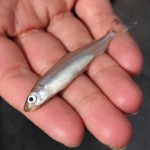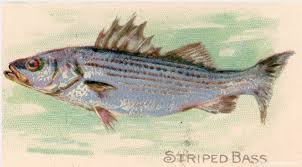– When it eats an endangered species.
The striped bass (Morone saxatilis) is a prized gamefish native to the Atlantic coast and Gulf of Mexico. It can reach five feet in length, exceed one hundred pounds in weight, and is excellent eating. In 1879, about 100 juvenile striped bass were transported from their home in New Jersey to California’s San Francisco Bay Delta estuary at the instigation of the California fish and game agency. Over a period of years, there were other introductions of stripers into California waters, including by the predecessor agency of what is now the US Fish and Wildlife Service.
Ironically, this is the same Fish and Wildlife Service that in 1973 came to administer the Endangered Species Act (ESA). A small fish called the Delta smelt, native to the same San Francisco Bay Delta where state and federal agencies earlier introduced the striped bass, was listed as Threatened under the ESA in 1993. Unfortunately, Delta smelt are just the right size to make a good meal for a young striped bass.
 While the Delta smelt is certainly not the exclusive diet of striped bass in the San Francisco Bay Delta, the striped bass’ healthy appetite is no doubt helping to suppress the recovery of the Delta smelt. The implications for California water users and farmers are significant. The federal government has reduced water deliveries from the Bay Delta to farmers in California’s fertile Central Valley in an effort to leave more water in the San Francisco Bay Delta to help the delta smelt. Water deliveries to urban water consumers in Southern California have also been affected by this federal regulatory activity. One wonders how much of this induced water shortage is doing any good for the Delta smelt, in light of striped bass predation.
While the Delta smelt is certainly not the exclusive diet of striped bass in the San Francisco Bay Delta, the striped bass’ healthy appetite is no doubt helping to suppress the recovery of the Delta smelt. The implications for California water users and farmers are significant. The federal government has reduced water deliveries from the Bay Delta to farmers in California’s fertile Central Valley in an effort to leave more water in the San Francisco Bay Delta to help the delta smelt. Water deliveries to urban water consumers in Southern California have also been affected by this federal regulatory activity. One wonders how much of this induced water shortage is doing any good for the Delta smelt, in light of striped bass predation.
While the striped bass is a game fish, its predatory behavior also fits the definition of an invasive species, which is defined as “an alien species whose introduction does or is likely to cause economic or environmental harm or harm to human health”. By eating endangered Delta smelt, the striped bass is causing direct environmental harm and indirectly causing economic harm to agriculture and water users in California.
One thing humans have learned how to do over the last century is how to effectively deplete a fishery. Shrinking the bass population in favor of the Delta smelt is well within the capabilities of fishery managers. The question is, will California fishery managers focus on protecting the endangered Delta smelt and the water users affected by it, or the anglers who enjoy catching the striped bass?

